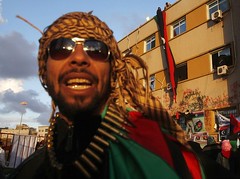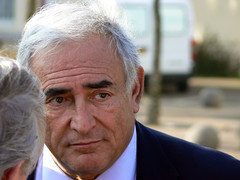Ayanna Nahmias, Editor-in-ChiefLast Modified: 13:15 PM EDT, 30 March 2012
“And why beholdest thou the mote that is in thy brother's eye, but perceivest not the beam that is in thine own eye? Thou hypocrite, cast out first the beam out of thine own eye, and then shalt thou see clearly to pull out the mote that is in thy brother's eye.”
CALIFORNIA & FLORIDA, United States – This past week Americans heard or read news reports of the brutal deaths of two people apparently because of race and faith. Their stories played out on the East Coast to the West, and both deaths are symptomatic of increased levels of xenophobia in a post September 11th America.
We are speaking of the deaths of Shaima Alawadi and Trayvon Martin. Both victims of racists, these two people have fallen prey to the xenophobic fears of their murders.
In the Nahmias Cipher Report we focus on atrocious human rights violations in Africa, India and the Middle East. Because we are based in the States, some people may feel superior to these 'other' people that we write about, as if those cultures lack the appropriate moral fortitude to control their behavior.
In some cases this is true, but in the case of Ms. Alawadi and Mr. Martin, these reprehensible acts of violence bring America in parity with the rest of the world's cultures and countries with abysmal Human Rights record.
In El Cajon, California, Shaima Alawadi was beaten to death in her home by an unknown assailant. Though the identity of the murderer has not been determined, based upon the evidence that the police found at the scene, it appears that this is a hate crime.
Alawadi’s 15-year old son, Mohammed said that recently he came home and discovered a note taped to the front door of their house which read, “This is my country. Go back to yours, terrorist.”
As residents of this quiet suburban community, neither Alawadi, nor her family thought much about the note, instead attributing it to mischievous neighborhood children. Despite her husband, Kassim Alhimidi’s desire to report the incident to the police, Alawadi didn’t feel that it was warranted.
Alawadi and her husband were Iraqi immigrants who have lived peacefully in the United States for 17 years. All five of their children were born in the United States and this is the only country that they have known because they are Americans. Post-9/11 the Alawadis have experienced increased discrimination such as being called ‘terrorists,’ but they shrugged off these slurs as ignorance.
But last Wednesday, Ms. Alawadi was discovered by her 17-year old daughter, lying unconscious in a pool of her own blood. Badly beaten, with a severe head wound, her daughter discovered another note similar to the earlier one, lying next to her mother.
Though the police are reticent about proclaiming this killing as a ‘hate crime,’ many Muslims in the El Cajon community feel that Alwadi’s death was definitely a 'hate crime' because she was easily identifiable as Muslim. Ms. Alwadi wore the tradition Hijab of observant Muslim women, which may have contributed to her being singled out.
Like many communities across America, as war and strife rage out of control in nations across the globe, and particularly as factions fight over resources in emerging economies, the citizens of these countries pay the highest price. In an effort to secure a better, safer future for their families they often leave their countries and immigrate legally or illegally to more stable countries like America or other European nations.
Thus, there has been an increased influx of immigrants from heavily Islamic nations in Africa and the Middle East where America is currently engaged in war. For instance, in Lewiston, Maine, where I went to college, there is a thriving community of Somalis who have fled the strife of their unstable government or lack thereof.
Here in Northern Virginia, there is an equally large community of Middle Easterners from all across the Arab world. In fact, one of my best managers is a Palestinian who immigrated to the States from Jordan nearly twenty years ago.
In Miami, where I lived for nearly a decade, the predominant immigrants are the Cubans, but other South and Central American Spanish speakers have also taken root. This has occurred to such an extent that one can drive through neighborhoods where the signs are in Spanish and many of the people who live there don’t speak English.
Just like these three areas of the East Coast, El Cajon, just northeast of San Diego, was also transformed from a largely white and English-speaking area into a more multicultural and diverse community. Two decades ago, as wars in their homelands increased in intensity, more and more Iraqis and other Middle Easterners immigrated to the States.
El Cajon now houses one of the largest Iraqi communities in the country. Like Miami with the Cubans, El Cajon now has numerous Middle Eastern grocery stores and restaurants, Mosques and other religious centers, and many of the pedestrians can be heard conversing in Arabic.
Yet there are xenophobes in this nation that still believe if you are Middle Eastern then you are not a citizen, and were born outside of America. If you wear a turban, like many Indian Sikhs, then you are a terrorist. And for the purposes of this report, if you are an Iraqis who lives in El Cajon then you are Muslim, when in fact many Iraqis who reside in that community are Christian.
The case of Trayvon Martin in Sanford, Florida, harkens back to the racism of the Old South in which Klu Klux Klan members could burn, tar and feather, hang, decapitate, and castrate black men with impunity. That is what makes the case of Trayvon Martin so polarizing.
The fact that his killer, remains free despite police tapes which indicated his culpability, reinforces the stereotype that if you are a ‘black’ male in America then you are a violent criminal who must be subdued at all costs, including deadly force.
George Zimmerman, a self-appointed neighborhood ‘watchman,’ shot and killed an unarmed black teenager because he was ‘walking’ in the gated community where the vigilante lived. Zimmerman who claims that he is ‘white’ has been identified as Hispanic, another population which has experienced a great deal of discrimination over illegal immigration issues.
However, this did not stop Zimmerman from singling out Trayvon Martin, 17, and shooting him because he looked ‘suspicious.’ Martin was reportedly on his way home when he was confronted by Zimmerman who asked him what he was doing in the neighborhood. Zimmerman, who was on the phone with the police, could be heard talking to teenager in an accusatory tone.
Since a car had been dispatched to the scene, the police advised Zimmerman to stop following the youth, as they were on their way. Zimmerman pointedly ignored the injunction and continued to pursue Martin. It is unclear what occurred next, but Zimmerman, a man twice the size of Martin, claimed that the teenage attacked him and that he fatally shot the teenager in self-defense.
Zimmerman, a self-appointed neighborhood ‘watchman,’ was taken into custody shortly after the police arrived to find Martin dead; however, he was subsequently released and has remained freed since the shooting, despite nationwide calls for his arrest.
Much like the story of Sub-Saharan Africans who are being targeted in Libya, America’s struggles with race have seemingly digressed since the election of President Barak Obama. One would think, like the election of former South African President Nelson Mandela, another first ‘black’ president; that there would be a more profound paradigm shift in America.
However, the exact opposite has occurred as people so steep in racism and xenophobia feel inspired to act out their racism by deliberately violating the human rights of fellow Americans who have done them no harm. As one reader pointed out, there are just as many good people who are outraged by the behavior of racists, but the fact remains that incidents like these are on the rise.
It remains to be seen if the perpetrators guilty of killing Alawadi will be found, convicted and sentenced to death, a sentence which they unilaterally meted out against her for no just cause. Or if Zimmerman will be charged, convicted, and sentenced to a long jail term for murder; a crime which if a ‘black’ man had committed but the circumstances were in dispute, he would certainly be incarcerated pending the outcome of the investigation.
Shame on these people and as Alawadi’s son said, “There’s only three people that know what happened, God, my mom and the guy who did it.”
Follow Nahmias Cipher Report on Twitter
Twitter: @nahmias_report
Editor: @ayannanahmias













































